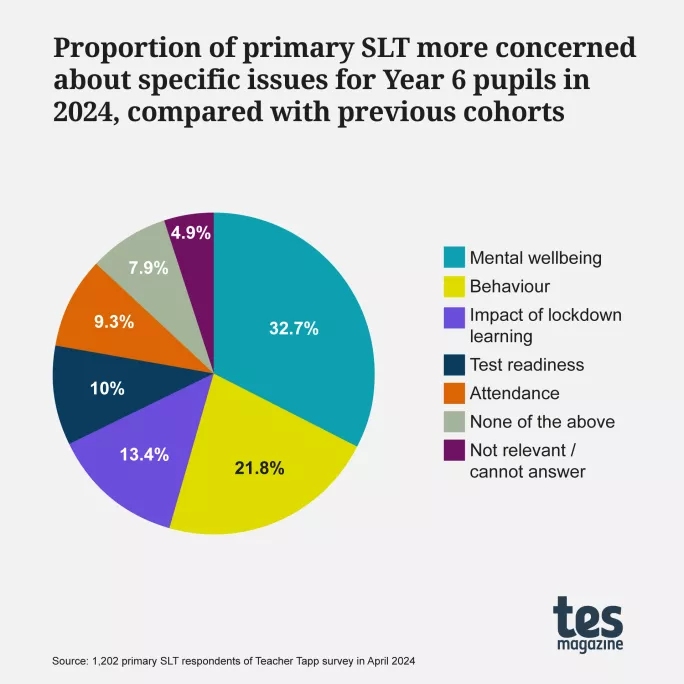Sats: Wellbeing and behaviour warning ahead of tests

A third of primary school leaders are more concerned about the mental wellbeing of their Year 6 pupils this year compared with their previous cohorts, according to a survey shared with Tes.
And more than one in five primary senior leader team staff (22 per cent) are more concerned about the behaviour of pupils in the final year of primary this year, the Teacher Tapp poll shows.
The findings come as primary schools prepare to run key stage 2 Sats across England next week for the second cohort whose learning was disrupted by the pandemic. Sats were cancelled due to Covid in 2020 and 2021.
Primary leaders warn that the disruption caused by the pandemic has had a lasting impact on pupil wellbeing, with the current Year 6 missing a “critical” time in their development.
Wellbeing and behaviour issues in Year 6
Pupils currently in Year 6 would have been in Year 2 at the start of the first Covid lockdown in March 2020.
Lee Mason-Ellis, CEO at The Pioneer Academy, which runs 17 primary schools in the South East, said: “We remain very aware that this Year 6 cohort missed out on many of the normal experiences they would have had in Year 2 due to the pandemic.
“I believe we are still seeing the impact of this in schools around the country.”
The pandemic impacted the socioemotional development of around half of pupils in England, a report by the Institute for Fiscal Studies found last year.
- Children’s mental health: Are schools being asked to do too much?
- Sats: Results should not be public for next two years, says NAHT
- Primary assessment: Most teachers running key stage 1 Sats this year
Chris James, headteacher at Weyford Nursery and Primary Academy and Bordon Junior School in Hampshire, said: “Worry and anxiety are definitely on the rise. This used to be a problem for a few pupils, but we’re finding that it’s now affecting more children than it used to.”
He added that since the pandemic “a wider group of parents are also anxious about Sats and secondary school transition, which, of course, impacts on the children”.

And Helen Slack, headteacher of Twickenham Primary School in Birmingham, warned that missing a “key stepping stone in their development” because of Covid lockdowns has had a direct effect on pupils’ sense of independence and resilience.
“They really missed that critical time. When they came back to school, we were working in bubbles and they wouldn’t have had the key independence and socialising time,” she added.
‘Enormous spike’ in mental health conditions
The finding that one in five primary senior leaders are more concerned about Year 6 behaviour this year comes amid warnings that pupil disruption is becoming an increasing issue in schools.
Three-quarters of teachers warned in a recent government survey that poor behaviour was causing regular interruptions to lessons and impacting their mental health and wellbeing.
However, despite growing awareness of the increase in mental health difficulties for pupils, particularly in relation to the attendance crisis, the government has been accused of being slow to roll out support. Headteachers have called for a faster expansion of mental health support teams.
Pupils at nearly three-quarters of primary schools will not have access to mental health support teams by the end of this year, according to an investigation by the Liberal Democrats.
Young Minds, a children’s mental health charity, said it has seen an “enormous spike” in the number of pupils with a diagnosable mental health condition in recent years, and this has led to behaviour issues.
Adam Jones, policy manager at Young Minds, said: “One of the recent trends that we’ve seen through our parent helpline is the number of parents reporting interrelated behavioural mental health issues that are manifesting with much greater complexity at much earlier stages of life for young people.
“There is not a proportionate amount of funding relative to need for children’s mental health. That is a big part of the reason why there are so many issues manifesting in school settings that teachers can’t and shouldn’t be expected to be able to deal with on a clinical level.”
Despite growing concern about attendance in secondary schools, primary teachers are less worried about absence than those who teach KS4, the Teacher Tapp poll shows.
Less than one in 10 primary leaders (9 per cent) said they are more concerned about Year 6 attendance this year compared with last year, with a similar proportion (10 per cent) saying they think assessment readiness is more of a problem in 2024.
Pressure on schools to achieve results
Increased pressure on teachers over outcomes could also be filtering through to some pupils, leaders have warned.
Ms Slack said that pressure has increased on teachers and schools, which is “bound to transfer to some of the children”.
She added that the proliferation of assessments carried out during primary years is an “awful lot of pressure to put on children”. “The whole school system is focused on results no matter how much you try and manage it as an individual school,” Ms Slack said.
National government league tables - which share statistics on the attainment of primary pupils - returned last year after being cancelled for three years from 2020-2023.
Tiffnie Harris, primary specialist at the Association of School and College Leaders (ASCL), said primary leaders’ anxiety about getting “the best results” could filter down to pupils.
“[Children] are taking extra Sats classes and extra catch-up classes, reducing break times and lunchtimes, maybe stopping swimming classes to do extra lessons - all of this is happening against a backdrop of poor attendance,” she said.
Research carried out in December by Teacher Tapp and UCL IOE, Faculty of Education and Society, commissioned by campaign group More Than A Score, suggested that 20 per cent of teachers were doing more than three hours’ preparation a week for Sats.
When this research was carried out again in April, 38 per cent were doing over six hours, and one in 10 schools reported over 15 hours of test preparation a week - equivalent to three hours every day.
The NAHT school leaders’ union has called on the government not to publish school-level performance data publicly for the next two years, arguing that publishing a single year’s attainment data alone could lead to “simplistic” school-to-school comparisons.
More SEND support needed
Michael Tidd, headteacher at East Preston Junior School in East Sussex, said a “small number of higher-need” pupils with social, emotional and mental health needs has created the impression that there is a worsening picture for mental wellbeing among primary pupils.
“We have got some children who previously may be accessing more support or were in specialist provision who are now in mainstream,” he said, adding that this means “you’re having to put in a lot of support for a very small number of children”.
This “exacerbates the sense that there’s a bigger problem”, Mr Tidd continued.
But Mr Mason-Ellis said: “This Year 6 cohort have significantly more SEND and wellbeing issues than in previous years across many of our schools, and this has required more support than in any other year.”
James Bowen, assistant general secretary of the NAHT, said the union has also “seen an increase in the number of teachers concerned about the wellbeing and behaviour of their pupils, particularly those in their final year of primary school”. He added that this is a “crucial year” as schools want to “see pupils confident and well-equipped for the transition to secondary school”.
Pepe Di’lasio, general secretary of ASCL, said that while schools are doing “everything they can to support all of their pupils and address these problems, they are under-resourced”. This means “cuts to pastoral teams and their capacity to provide extra support”, he warned.
“Government action is needed on a number of fronts - more focus on ending child poverty, investment in local services for children and families, sufficient funding and reform to the special educational needs system to enable earlier intervention, and sufficient funding for schools in general,” Mr Di’lasio said.
Mr Bowen echoed the call for resources but warned that “ultimately there are no quick fixes”.
“Schools need the resources and time to support the wellbeing of pupils as well as the ability to draw on more specialist services when necessary,” he said.
Ms Slack also said more work needs to be done to change a culture that has led schools to “compete against one another” - “whether it be by your Ofsted judgement, by your results or whatever factor [the government] choose”.
“Everybody comes to school to make it a very happy time for children. That should be our core focus, but the system is totally at odds with that,” she added.
For the latest education news and analysis delivered directly to your inbox every weekday morning, sign up to the Tes Daily newsletter
Keep reading for just £1 per month
You've reached your limit of free articles this month. Subscribe for £1 per month for three months and get:
- Unlimited access to all Tes magazine content
- Exclusive subscriber-only stories
- Award-winning email newsletters
topics in this article



